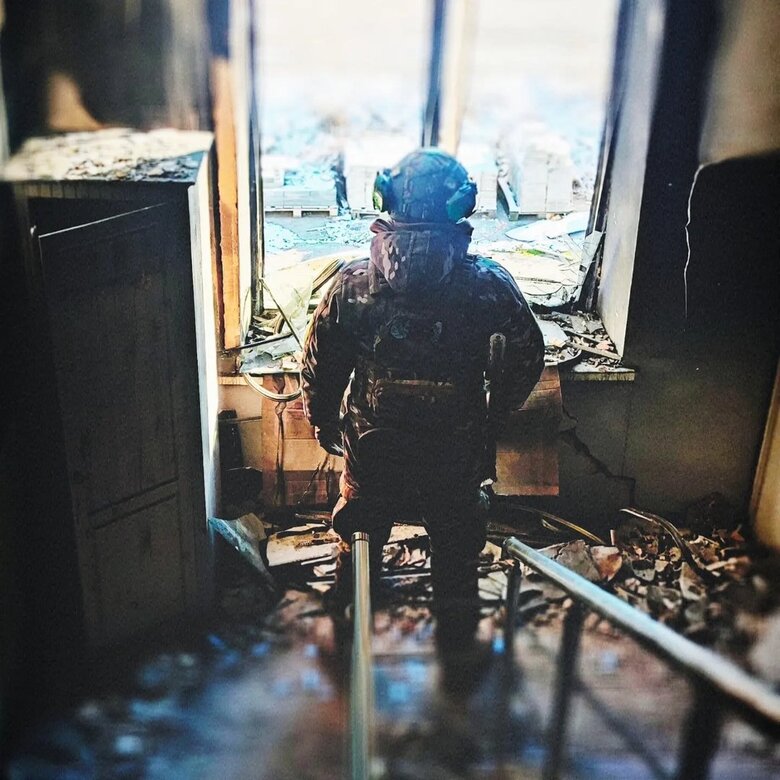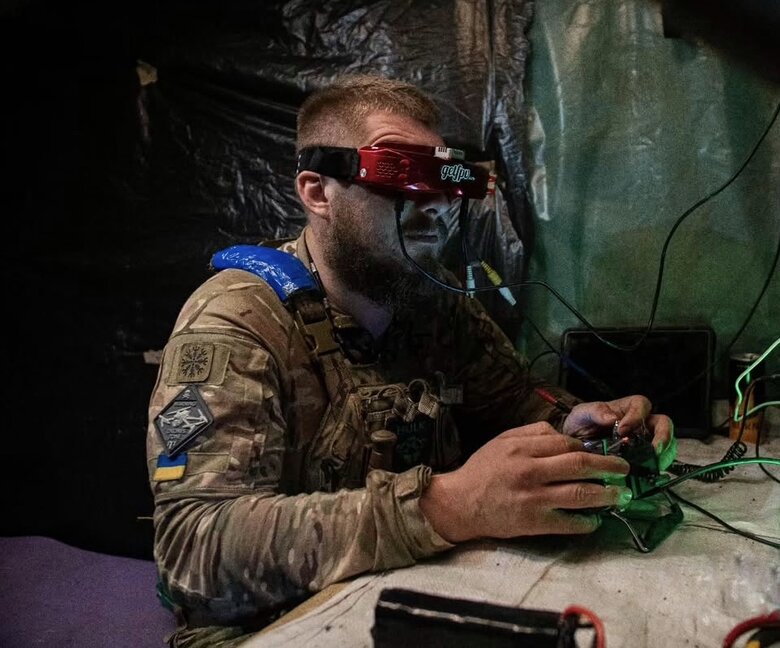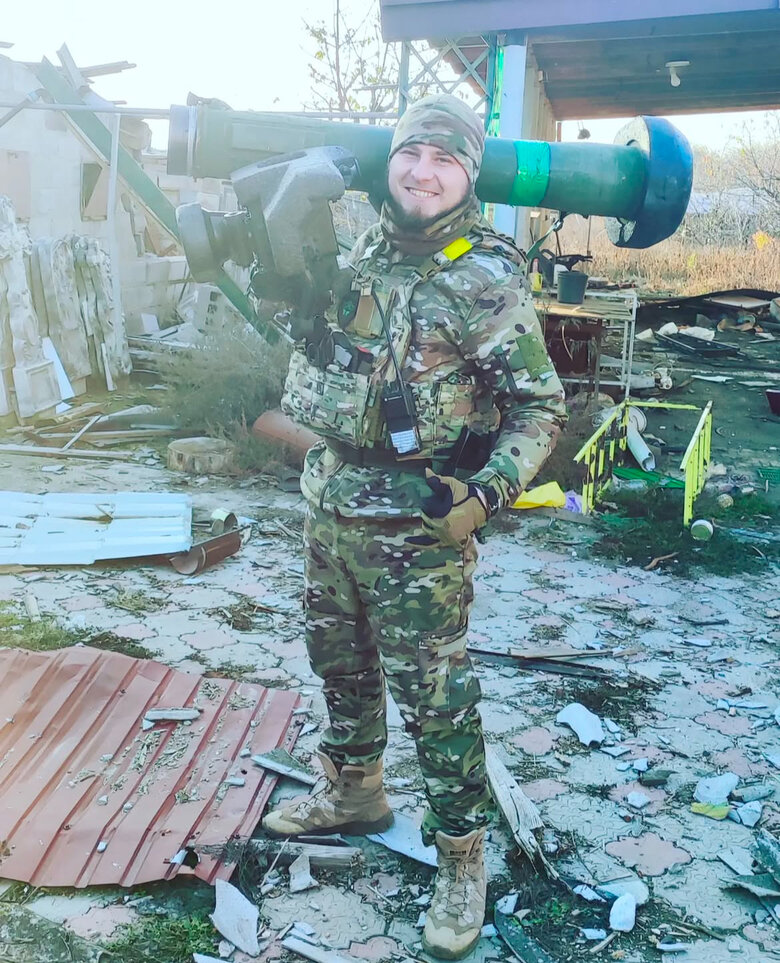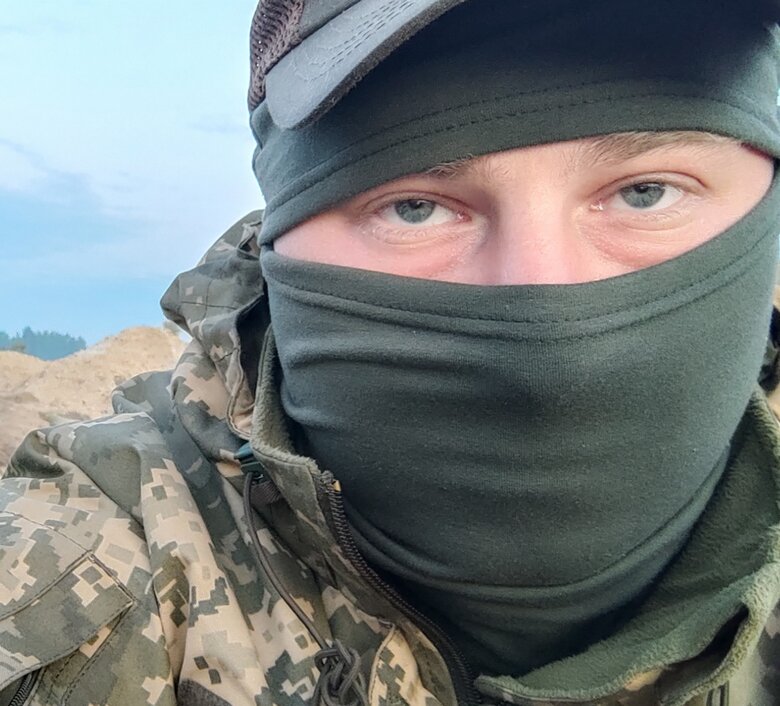Pilot with call sign Hulk: "I flew very close to helicopter. I was excited then: I had to destroy helicopter as well."
Roman went to war at the age of twenty-five. Before that, he was engaged in freight transport, working for his friend. But at the beginning of the full-scale invasion, he went to fight. He is currently a pilot in the BULAVA unit of the 3rd Mechanised Battalion of the Separate Presidential Brigade named after Bohdan Khmelnytskyi. For his work, he has already received two Orders "for Courage". His call sign is Hulk.
- "He is one of my favourite Marvel characters," he tells me in an interview. "I've been fascinated by him since I was a kid, since I was twelve. I wore clothes with his image on them. Just a fan.
- Let's start from the beginning. Where did the full-scale invasion find you?
- At home. I woke up in the morning to a call from my friend who said that all the airfields were under attack from ballistic missiles. I contacted my family and warned them, although everyone had already knew.
Do you know what's interesting? When I slept that night, I dreamt that I was at war. I woke up and it was happening in reality. It turns out to be a prophetic dream. So when my friend called me, I didn't fully understand whether I was dreaming or not.
- Were you shocked by what was happening?
- Of course, I was shocked. Although my father had warned me that there would be such a war. So in October 2021, I planned to sign a contract and get ready. But then it didn't work out.
- What did you do after you realised that a full-scale war had started?
- I gathered my family and took them away from Kyiv, as I realised that there would be fighting here. First - to Khmelnytskyi region. There I went to the military enlistment office, but they did not accept me. They told me to wait. We moved to Rivne region, where I had already passed a medical examination. At that time, the deputy head of the military commissariat talked to me for a long time, asking me questions: "Why do you need it? You are so young! Stay at home for a while"...
- How old were you then?
- 25. So, he talked me out of it, but I said I would go anyway. We went to the military commissariat with my girlfriend's father. In the evening, he received a phone call and was told that we were staying in the reserve and were not going anywhere in the morning. He took this information as if it were about him. I thought I was going to go anyway. In the morning, I went to the military commissariat with my things. When we were boarding the bus, they read out the list, and I was not on it. I made a bit of a fuss. In the end, the commissioner told me to go. They put a chair for me on the bus (smiles - O.M.). When we arrived at the military unit, half of the people had fallen away...
- Why?
- Probably, at the last minute, they decided to do it. I didn't really focus on that. The rest of us were sent to the Yavoriv training ground. On the first day, we were assigned. On the second day, we tried to get a military uniform, but failed. On the third day, we were alerted and told that missiles were flying at us. We went down to the basement, where there were already a lot of people. I was so tired that I fell asleep on the pipe. I slept for an hour. I woke up to the sound of air defence. I had a little shock. And then the first arrivals began. One missile hit a neighbouring building. The second one landed on the parade ground in front of our barracks, which had already been hit by the third missile. We lost power. But at that time, I didn't care what was happening, because I really wanted to go to the toilet (laughs. - O.M.). So I had to get out of the basement as soon as possible to make my life easier. It was a funny story. However, the laughs stopped when the "200s" and "300s" of our patrol officers who were standing on top started to bring in. Unfortunately, we couldn't save many of them... An hour later, we got out of the basement and saw the aftermath of the attacks. I was shocked that I was lucky to survive.
And then what? They put on my armour, gave me a machine gun and said: "Run upstairs". So I ran (smiles - O.M.). They told us not to go further than 500 metres, because everything was mined. We understood that they meant to keep us there because they were afraid that many people would run away. But no one escaped from our platoon. We froze there all day because we were dressed in what we ran out of the barracks in - some in underpants, some in socks without slippers. We were left naked and barefoot. There was nothing to keep us warm. In the evening, we were sent to Kyiv. I get off the train and think: this is where I need to go! At that time, there were still battles on the outskirts of the city, and I went to war with the idea that I would defend my city. I was already thinking that something was about to happen. However, we were not sent into battle for some time. We were undergoing training. Then the Katsaps withdrew from Kyiv. We continued to train as anti-tankers. I was very motivated, I was always thinking when I would get to the front. By the way, I still am. Although today it is very difficult...
- Because of fatigue?
- Of course, it's also because of fatigue. Soon it will be three years since I have been at war. It's a bit hard. When you go on holiday, it's harder and harder to come back. Because you compare civilian life with what you go through here, and these are, let's say, very Spartan conditions. Not everyone can withstand them. Sometimes you get emotionally overwhelmed, but you try to control yourself. Unfortunately, it doesn't always work out. Sometimes it affects your family and friends. It's a bit upsetting.
- How did you get to the front?
- At first, we went to the area of Chornobyl, because a second attack on the Kyiv region was expected. We prepared there. Later, I was offered to be part of the first batch of people to go to training in the UK. We were lucky, because we got military instructors who were the most qualified NATO specialists. They helped me a lot in understanding what could happen at the front. Of course, not everything, but I learnt a lot of important things. After returning from there, we received a combat order to move to the Donetsk region to take part in combat operations. I remember the excitement. I was driving and thinking: I always knew that I would come here one day (smiles - O.M.), because I had never been here before. We arrived, got out of the cars. We were told not to scatter. But one soldier from the ninth company went to the toilet and, unfortunately, hit a mine. I don't know if he survived, because I didn't ask. Then we realised we were in real combat conditions. So we focused on that. At first, we lived in the forest. We dug trenches and slept in them. We were lucky that we had brought tents from Britain, so we used them to cover ourselves from the rain and sleep in our sleeping bags. On the fourth day, I was told that I needed to learn how to work with "Javelin", so I went to Kramatorsk. I came back in a day and in the evening I already went to zero. It was my first trip. I was travelling in the back. I had to keep an eye on the sky for enemy UAVs, and if they appeared, I had to warn the driver. For an hour and a half, I was watching and thinking, where am I going? But there was no fear yet. When I arrived, I immediately asked where, what and how they were shooting. I was told that I would understand. We took up our position. We started digging in. About an hour later, the shelling started. The artillery was firing 400 metres away from us, and I had the feeling that it was hitting me. I mean, I didn't understand how it all worked, how to listen properly, how to distinguish. And then I was told that we already had the 200th and 300th. I was not so scared yet. But when I found out that the deceased was the person I was talking to before leaving near the car, I couldn't come to my senses for about a day. My hands were down. It was hard. But then I realised that there was no escape from this. So I put aside thoughts of what might happen and started doing my job.
- What have you worked with besides the "Javelins"?
- We had a lot of weapons: "Javelin", "Stugna", "Corsair", "Fagot". At first, we worked with the infantry. There were times when we stood with our "ATGMs" 150 metres in front of the Katsaps. It was hellish! There were times when we occupied the edge of the village with "Javelins", RPGs and assault rifles. In other words, we were both infantry and anti-tankers at the same time. We also conducted reconnaissance with "Mavic".
- Is that why you became interested in UAVs?
- Indeed, it was then that I became interested in these flights. I realised it was mine because I could see the smallest details. I found the Katsaps in places where they were hard to spot. Sometimes I worked with a drone and an SPG-9 grenade launcher at the same time. Then he started dropping grenades from the "Mavic". This story touched me even more. And then our previous commander showed us FPV. He told us all to try it to see if we could do it. My fellow soldier Vazquez and I were immediately interested in this topic when we saw what these drones could do. We would go to the battlefield for six to seven days, and when we returned for three days to rest, we would practice on the simulator for four to five hours. When we had flown more than 60 hours, either volunteers sent us or we bought (I don't remember) small FPVs. So we started practising a bit.
- What was your first flight like?
- Silly (smiles - O.M.). As always, I was curious, and I thought: I'll go up higher and have a look. I flew up to 50 metres, but there was a strong wind, so the drone was blown away. We had only one drone at the time. We searched for it for an hour and a half. We found it on the roof of a barn. The one who lost it had to climb for it. At that time, I weighed about 108 kilograms. And the slate is quite fragile. I was climbing up, my legs were shaking (smiling. - O.M.), but I realised that I had to get the drone. I managed to do it! That's how our practical training began. Vasquez and I had this competition: he would come back from a trip, show me on video how he was flying, and when I saw that he was getting better, I would do even more flying. That's how we improved. And then volunteers gave us two five-inch drones that could already carry some weight, albeit a little. We flew them for about a week. Then we got seven-inch drones. We didn't have enough drones, so we started doing FPV drops. At that time, no one else was doing it. We learnt how to drop 60mm mines, cumulative shells to break through dugouts. Then we went to our first FPV position. It was the summer offensive. We worked independently for three days. Our first target was the MT-LB. Around the fifth day, the psychological stress began to show. It was such a hard day that we were "burned" by everyone who was not too lazy - Katsap tanks, artillery, aviation. They hit us simultaneously, and I had to return the drone. The commander said: "Throw it and take cover!". I: "No, I need to return it, because we have few of them". That is, the brain was not thinking about itself, but about what needed to be done. We pulled ourselves together and started working normally. I was saved by the fact that I am good at navigating and memorising the terrain. So I watched a stream where a tank was travelling, took off and knew how to find it. I destroyed the targets by drops, not by going in like a kamikaze, because, as I said, there weren't many drones. Later, more drones started coming from the "Wild Hornets", because they saw what we were doing, so there is hope for us (smiles - O.M.). My first destroyed artillery, the "Akatsiya" or "Gvozdika" self-propelled artillery system, has already gone. It was the first flight at a distance of 12 kilometres. We hadn't flown even seven kilometres before. And then we decided to take a chance. Everything worked out. I began to understand how far I could work. Everything comes with experience. I was always learning something new, trying new things. It helped to destroy the enemy.
- You mentioned that you were good at destroying equipment. The military tell me that the enemy is constantly changing tactics. Sometimes they just come in small groups. How do they operate in your area?
- In different areas, in different ways. In some places, they use infantry, and in others, they use equipment. They look at the result. When, for example, the columns are completely on fire, infantrymen are sent in - either on motorbikes or golf carts. And when there are difficulties with FPV in the area, they go in with equipment. In some places, our drones may not reach their targets when their electronic warfare systems work more effectively, and in others, there are no ATGMs. In our direction, there is basically no equipment now. But there is some after a couple of villages. We would also like to set it on fire. For now, we are just catching the katsaps who are walking.
- Your brother-in-arms Skif told me in an interview that your unit had cases of such powerful enemy attacks that 40 drones were destroyed in a day. Tell me a story like that.
- Last year, there was a time when they were planning an attack on our positions. We managed to destroy two hangars with equipment and the BC warehouse. Here's what it was like. I woke up in the morning and was told that "Grad" was firing from the village in front of us. I understood what the target was. We had never seen anything like it. I shout to my partner: "Let's fly! Let's destroy it". It turned out that it was a S-60. It fired four or five shots, so it seemed like a "Grad" was working. We destroyed it. I thought: well, at least something (smiles - O.M.). Then another S-60 comes in. I fly up and see that it is parked in the hangar. There is something else behind it. I hit it and it caught fire. It detonated. I take off with the third drone. I didn't want to waste it on the equipment behind that S-60, because it was going to catch fire from it. There was a big hangar next door with some equipment. I flew in, and there was an infantry fighting vehicle and two tanks. The command gave me permission to destroy them. I fly into the tank and see that there are more targets - about a dozen. I realise that we have hit a gold mine. The command says: "Wait, why are you wasting so many drones? We'll use the "Himars" to target them." I gritted my teeth and agreed. I waited for about an hour. Nothing happened. I called the commander: "Let me take off! I will slowly dismantle those hangars". He gave me permission. After all, it would have been dark in an hour and a half, and the enemy would have taken the equipment. And we managed to destroy it in that time. Their commanders came there, looked at it and realised that they would be getting the full blast for destroying so many units. While they were looking, we burned their car as well (smiles - O.M.).
The next day, the enemy attacked with three tanks, one of which got stuck in a trench. We destroyed it. The other two almost reached us, but we turned them around with FPVs. In the afternoon, our position was "burned", they started to hit us with Grads and drones. My partner and I thought we would never get out. But we were lucky - we managed. However, we got shell-shocked, so we had to rest for a while and then continued working. In about two weeks, we had a very large attack - five or six units every other day. We managed to destroy about 70-80 of them. That is, our FPV unit made sure that all that equipment almost never reached our infantry. But unfortunately, the enemy then sent in countermeasures - EWs. We solved this problem and continued to destroy the equipment. Then there was a lull. So we worked on the far rear positions. We found self-propelled artillery systems, "Grads". We were trying to destroy the "Solntsepyok". This is a priority target for us now, which every pilot wants to burn. Once I almost succeeded, but it didn't catch fire. My partner did the same thing: he caught it, hit it, but there was no ignition, and the "Solntsepyok" drove off. There was also a moment when I flew very close to a helicopter. I was excited then: I had to destroy the helicopter as well. I haven't succeeded yet, but it is also a priority (smiles - O.M.).
- How would you describe the current phase of the war?
- Critical. As sad as it may sound, we are losing ground, losing our brothers every day. The enemy is now advancing very massively. To fight back, we need to have good support, including drones. And it is not like that today. We have to survive in these difficult conditions. The ideologically motivated are trying to do everything in their power. The frontline is held together by such people.
- Against this background, how do you feel about talking about a possible freezing of the war?
- Freezing the war will allow the enemy to gather enough forces to completely break through the front line and go very far - Dnipro, Zaporizhzhia, Kherson, Odesa, Sumy, Kharkiv, Kyiv. We need to act now, not freeze the war.
- Our Western partners are talking about a possible end to the war through negotiations. In particular, the newly elected President of the United States, DonaldTrump, initially stated that he would end it in 24 hours, but then his deadline was shifted by at least six months. We can see that the Russians are not going to withdraw and are actively advancing. What do you think about this whole situation?
- We do not pay attention to statements that the war will end in 24 hours or the day after tomorrow. We see the fact that the enemy is advancing and does not stop. If they wanted to end the war, it would have happened long ago. There have been so many conversations on this topic. That is why we do not focus on such things. Imagine if the soldiers who are here start thinking that tomorrow the war will end. Then the entire frontline will relax and fall apart. Today we are repelling the enemy's attacks as best we can. I don't even think about when something might happen. You know, I am not a politician. I don't know what is going on over there. I would like each of them to go through at least some of the stages that we are going through here. Then the war would be over in a very short time - I assume within hours.
- Another question is the intentions of the Russians. Apparently, they will not leave us alone.
- Of course! The war has been going on for ten years. There were talks that it would end even during the ATO. But no! It's the same with a full-scale invasion. I don't even want to make any predictions. In general, I don't like to think ahead in life. Because something always goes wrong. For example, I was planning a holiday for my birthday, but it was cancelled because of the attacks. So planning is not for me. I live in the here and now.
P.S.: Dear friends, the BULAVA unit needs our help in purchasing drones to continue successfully carrying out their missions to destroy the enemy. If you are able and willing, here are the details:
🔗Link to the bank
https://send.monobank.ua/jar/49vsUToDYh
💳Bank card number
5375 4112 1924 8866
Olha Moskaliuk, "Censor.NET"
Photos and videos provided by the hero





